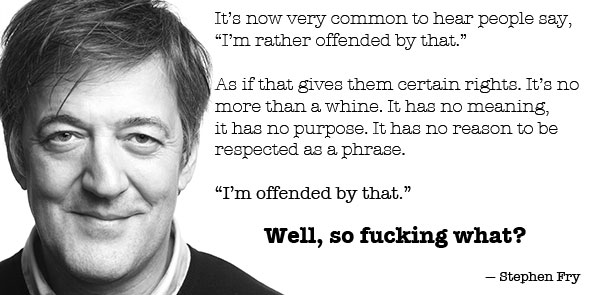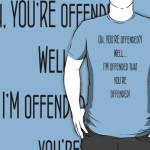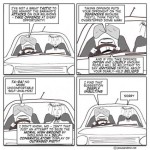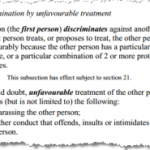What shocks people never fails to surprise me. Or rather, how they set out their stall of being suave, debonair, mature and hypermodern, claiming to be unshockable, but then taking offence at what may at first hearing appear to be a comparatively mild remark somebody might have made. This can be taken three ways:
- No matter how much of a brave face we put on things, no matter how thick-skinned we claim to be, each and every one of us has the Achilles heel – some point on which we are vulnerable. Not necessarily the obvious ones, so the question is whether the correspondent in a given conversation knows which buttons they have to press to gain a hostile and incendiary reaction, or whether they have stumbled upon the trigger point by accident.
- Of course, it could always be a dose of carefully staged tactical offence, designed to outwit the unwary and gain sympathy from onlookers as part of a bigger game plan to gain some advantage. Highly cynical, to be sure, but I’m quite certain it goes on, especially in the world of business and probably many other walks of life.
- Some people just love taking umbrage for any reason and will use the flimsiest pretext so to do, probably down to enjoying arguments for the hell of it! These people engage in large doses of schadenfreude and are hugely disappointed if their adversaries fail to rise to the bait, in which case the insults will probably become more naked, blatant and socially unacceptable until such time as the unfortunate protagonist loses their rag and responds in kind.
This is now a keenly-fought debate. In the red corner, we are still living in a country which values freedom of speech, and if robust opinions rub some up the wrong way, so what? Rather than being shrinking violets they should argue their case. In short, if they have a right to take offence, I have the right to offend. On the other hand, we still have laws protecting those who might be offended, from blasphemy to slander and libel, plus the unwritten laws of so-called “political correctness“- the institutionalised cultural phenomenon of going out of your way to avoid causing offence.
For all the bad press it gets these days, I think the self-censorship of PCdom has made a lot of the casually racist, sexist and homophobic conversation that not so very long ago might well have dominated conversation a thing of the past, which isn’t to say that you are prevented from making negative comments about someone individually and regardless of their race, gender or sexual preferences.
That’s the point: your beef is with the person, their behaviours, disagreeing with their arguments, not their background or lifestyle. But in our modern society, should we have the tight to have a go at someone for any reason, knowing that if you say something ridiculous you will be judged accordingly? Not if those words are deemed to influence a large number of people for the wrong reasons. If Imams stand up in their mosques and incite Jihad and hatred against other groups in society, they are now tried for offences under the Terrorism Act – and you would hope the same law would be applied equally to all other groups. You can express a free opinion so long as it is opinion, you have evidence to support it in the event of a libel suit, and so long as it does not cause ructions elsewhere. If someone is upset by it within those boundaries, only social and cultural sanction protect you.
Then again, what is offensive? It varies with cultures and generations, such that in very religious societies passing comment on the preferred deity could cause the grossest of offence, where in others in would cause barely a shrug. To some it might be inappropriate use of “swear words” that may in other contexts appear highly apposite. But do remember that nowadays you can get away with the f-word in 12 certificate movies, so words shouldn’t cause offence so much as the context in which they are used. If you happen to be in public life, the rules may well be very different than private life, but either way you know the worst will be taken in any reported utterance – as a certain ex-Chief Whip by the name of Mitchell might tell you.
Personal insults of the offended party won’t help, nor of their loved ones, favourite football team etc., but even without going that far comments about any physical attribute can easily result in someone taking pique, regardless of how true or false the accusation might be. In that light, best avoid any witty remark about someone’s height, breadth, nose, ears, haircut, tattoos, piercings, breasts, bum, skirt length, make-up or anything else worthy of ridicule unless you know them very well or unless you are trying to cause offence – in which case they may prove to have the skin of a rhino and take offence at absolutely nothing. Sod’s law.
Going on a first date is a good example of the sort of dilemma in modern relationships. On one hand you have to be careful not to overdo the flannel and flattery, but equally it can be tricky to avoid words, topics or behaviours that will cause offence. Avoiding farting or smelling of BO is a given, and it’s probably best to avoid more than a cursory venture into politics or religion unless you’re very sure of your ground, depending on whether or not you want or expect a second date. But after that it can become very murky territory.
Going on about ex-partners is usually as bad an idea as going on about yourself, but at some point in almost every date you can bank on hitting some subject that causes your date to bridle. A sensible person will spot the signs and move swiftly on to another topic, but some people lack any form of empathy. They will drone on and on, entirely failing to spot the impact they are having on the other person. In the worst cases they may well get clobbered as the other person leaves without further ado, leaving the insensitive talker to nurse their bruised ego and wonder what the hell that was all about.
Equally it’s best not to be oversensitive and fussy, but just act natural, whatever that is. The more you think and worry about what you’re saying, the less natural it will be, so finding the happy medium and watching for reactions as you speak is the best chance of success. If not, you may well find yourself on the flight path to instant conflict!
But that’s handling other people. How about when other people find your soft spot? It’s happened to everybody too – something said really rubs you up the wrong way, hits you where it hurts, somewhere on the spectrum from simply uncomfortable all the way to going hot and cold with fear, anxiety and anger?
If you’re going to argue back then the volume will increase and you’ll begin an increasingly incoherent and staccato barks of indignation, though most people will try to hide their reaction and weather the storm – though it’s highly probable your body will give you away. blushes are the obvious one, though body language as a whole doesn’t speak volumes so much as scream.
Stopping instinctive reactions will look even more wooden and artificial that it can only masking conflicted feelings. Doing it well requires great acting skills and much practice, but then again why bother? I’ve always thought that open communication, honesty and saying what you think in a calm and measured way without escalating the situation is the best response. If it waits to a later time, the emotions become amplified and the argument will be a thousand percent amplified and quite possibly lose all control and moderation.
So let’s finish off with the inevitable question: what offends me? Not much, to be honest, but when it does it does big time. The context point is critical but I try to stay calm and even-tempered unless the point at issue is simply impossible to ignore. The thing is, it’s a very self-conscious process. I know when my calm facade is dropping, and at that moment there is almost nothing I can do to stop it. Just sometimes in life you want to forget social niceties and just let rip, tell people exactly what you think.
You’ve got to admit it, you might later feel a sense of shame and wish to make up with the person in question, but at the time there is great satisfaction to be had from taking offence and giving back what was unceremoniously given.









